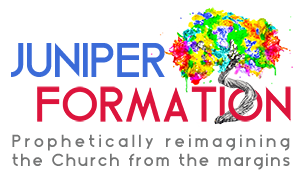Reflections from Our Bad Faith Community Conversation
A recap of our community screening and discussion at First Plymouth Congregational Church.
Last weekend, our community gathered for something difficult and necessary—a screening of the documentary Bad Faith followed by a facilitated conversation about Christian nationalism and our call as people of faith in this moment. After the film, we had a vulnerable discussion where we discussed and discerned how we could move forward together.
Opening Reflections
Folks shared where they were emotionally after witnessing the systematic organization and reach of Christian nationalism documented in the film. The responses were raw and honest:
Many shared that while they expected the film to be difficult to watch, experiencing it together with our community made all the difference in processing the emotions it brought up.
Several reflected on the heartbreak of witnessing the organization and implementation of Christian nationalist goals, with many noting the shift from fearing what could happen to seeing it actively unfolding.
Others spoke about the grief of watching loved ones—family members and former faith communities—become disconnected from gospel values they once shared. The integration of political and religious identity has created painful divisions in families and congregations.
The overwhelming sense from our group was recognition of just how organized, well-funded, and systemic this movement is—and how much work lies ahead for those of us committed to a different vision of faith.
What's Our Call?
When we asked, "What's our call in this moment?" the responses revealed the diversity of gifts and callings within our community:
Some spoke about their calling to share God's love with others who have been told by Christian nationalists that they are not welcome in God's kingdom.
Others shared their commitment to embodying love, mercy, and justice in every conversation, while acknowledging the need to find age-appropriate ways to contribute to justice work.
A few reflected on using their gifts to help others imagine different possibilities beyond what current systems tell us is inevitable.
Educators emphasized the importance of helping people understand that political engagement is actually part of faithful discipleship.
The Way of the Cross in Our Time
Others questioned what it means to follow Jesus's example of confronting empire. Participants reminded the group that Jesus engaged in acts that challenged the powers of his time and was willing to face both political and religious authorities who had become complicit with oppressive systems.
His words sparked important dialogue about what sacrifice and courage look like in our current context—not necessarily literal martyrdom, but willingness to sacrifice comfort, privilege, and complacency.
Joy as Resistance
One of the themes that emerged was the role of joy in our resistance. As one of our facilitators noted, "Joy is resistance." For those of us from marginalized communities, embodying joy becomes "antithetical to what systems and structures want me to embody. They want me to feel defeated."
This wasn't about toxic positivity or prosperity gospel thinking, but about the radical act of maintaining hope and community connection even while holding righteous anger about injustice.
Building Culture, Not Just Protesting It
A key insight from our conversation was recognizing ourselves as "cultural workers"—people who build and shape culture through how we are in the world. This happens in small acts: learning service workers' names and acknowledging their humanity, practicing good democratic processes in our churches instead of fighting and name-calling, building social fabric in isolated communities.
Stories were shared about simple but effective organizing efforts in conservative communities—creating coordination between scattered groups, building relationships with neighbors, and meeting practical needs in isolated areas.
Creating Space for Spiritual Journey
One of the most challenging questions posed was: How will we respond to former evangelicals who begin questioning what they've been taught? How do we process our own anger at the misrepresentation of our faith while still offering a path of transformation to those waking up to the manipulation they've experienced?
The recent addition of Crossroads Church in Fort Collins to our UCC conference was offered as an example—a congregation that lost thousands of members when they chose LGBTQ+ inclusion, then spent years finding a denominational home that matched their evolved values.
Moving Forward Together
Our evening concluded with recognition that we're being "baited into a civil holy war" and our challenge is to avoid that bait while cocreating a different path. This requires:
Relationship building across difference,
Creative imagination about what's possible beyond the current chaos,
Sacrificial love that may cost us comfort but builds beloved community,
Joy and hope as spiritual practices of resistance, and
Practical organizing that meets people where they are.
An Invitation
This conversation was part of our preparation for the Prophetically Reimagining the Church Conference this September, where we'll continue exploring how liberative faith communities can respond faithfully to our current moment.
But the real work happens in our daily lives—in how we practice democracy in our church meetings, how we build relationships across political difference, how we embody the radical hospitality and justice that Jesus demonstrated.
The Christian nationalists in Bad Faith offered their followers a sense of participating in prophecy, of having a special relationship with God, of finding spiritual home. Our challenge and opportunity is to offer these same deep spiritual needs through the actual gospel—one that includes everyone, seeks justice for the marginalized, and builds beloved community rather than tearing down democracy.
We are the church that believes different doesn't mean deficient. We are the church that knows love wins. And we are the church that will keep showing up, keep building relationships, and keep imagining the world that love makes possible.

